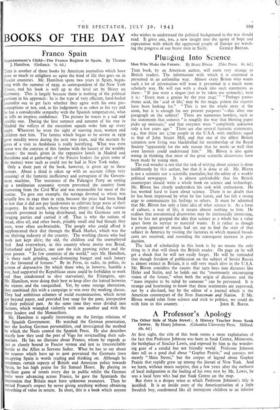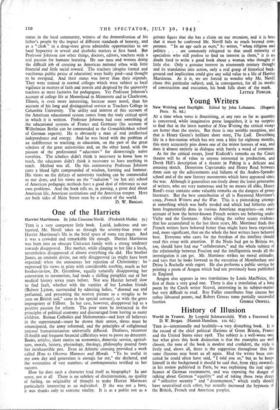A Professor's Apology
AT first sight, the title of this book seems a mere exploitation of the fact that Professor Johnson was born in Sauk Centre, Minnesota, the birthplace of Sinclair Lewis, and exposed by him to the wonder- ing gaze of a candid but not friendly world. Professor Johnson does tell us a good deal about "Gopher Prairie," and corrects not merely "Main Street," but the corpus of legend about Gopher Prairie that rapidly grew up among the literati of New York. And we learn, without much surprise, that a few years after the outburst of local indignation at the fouling of his own nest by Mr. Lewis, he was a local hero who had put Sauk Centre on the map.
But there is a deeper sense in which Professor Johnson's title is justified. It is an inside story of the Americanisation of a little Swedish boy, condemned like all immigrant children to an inferior status in the local community, witness of the demoralisation of his father's people by the impact of different standards of honesty, and as a " clerk " in a drug-store given admirable opportunities to see local hypocrisy in sexual and alcoholic matters at first hand. But Professor Johnson saw other things, doctors, editors, teachers with a real passion for humane learning. He saw men and women doing the difficult job of creating an American national ethos with little financial and little social reward. The teachers (despite formal and vociferous public praise of education) were badly paid—and thought to be overpaid. And their status was lower than their stipends. They were trained in normal colleges which were subject to local vigilance in matters of faith and morals and despised by the university teachers as mere factories for pedagogues. Yet Professor Johnson's account of college life at Moorehead in Minnesota and in Charleston, Illinois, is even more interesting, because more novel, than his account of his long and distinguished service at Teachers College in Columbia University. The utility and interest of this account of the American educational system comes from the truly critical spirit in which it is written. Professor Johnson had seen something of the educational systems of France and Germany (his account of Wilhelmian Berlin can be commended to the Gemiithlichkeit school of German experts). He is obviously a man of real intellectual independence and energy. And he was faced with the problem of an indifference to teaching, to education, on the part of the great scholars of the great universities and, on the other hand, with the passion of the professional " educators " for distressingly naive novelties. The scholars didn't think it necessary to know how to teach, the educators didn't think it necessary to have anything to teach. Method was all. On this controversy Professor Johnson casts a bland light compounded of wisdom, learning and humour. His views on the defects of university teaching can be commended to our dons, and his views on the " radiation " (or hot air) school of American pedagogic methods have a good deal of relevance to our own problems. And the book tells us, in passing, a great deal about American life, American institutions and the American temper. Here are both sides of Main Street seen by a citizen of the world.
D. W. BROGAN.























 Previous page
Previous page